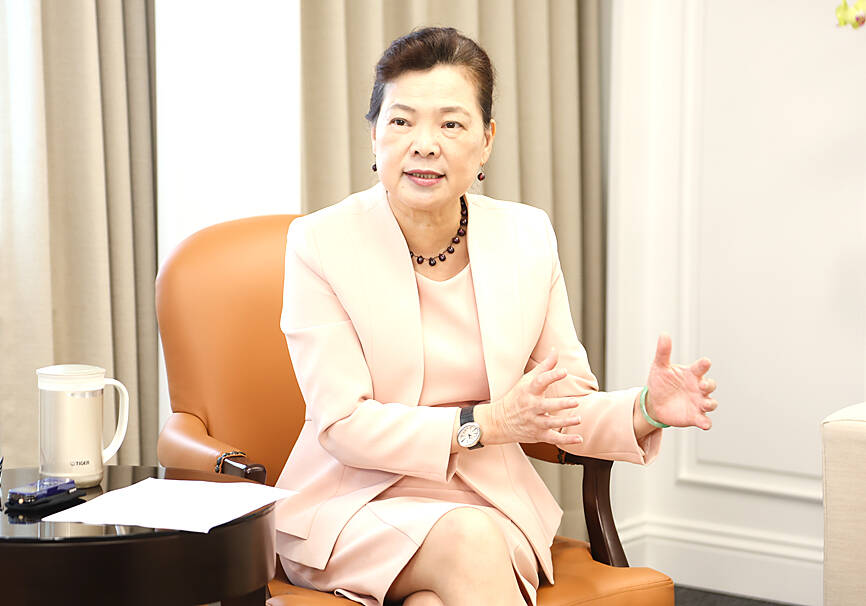US graphics chip designer Nvidia Corp is planning to relocate its Hong Kong-based logistics center to Taiwan, Minister of Economic Affairs Wang Mei-hua (王美花) said on Wednesday.
The government had been in discussions with Nvidia regarding tax incentives to facilitate the move since last year, Wang said in an interview with the Central News Agency, adding that the two sides had reached a consensus.
Wang did not provide details about the timetable for the move or the planned tax arrangements for Nvidia.

Photo: CNA
The relocation would boost the local economy, as Taiwan Semiconductor Manufacturing Co (TSMC, 台積電) is a major supplier of graphics processing units (GPUs) for Nvidia and many local computer makers are the US firm’s customers, Wang said.
Nvidia’s decision showed that cross-strait tensions do not deter global tech companies from choosing Taiwan as a destination for investment, the minister said.
It is unclear whether the relocated logistics center would be involved in the distribution of components to Nvidia’s partner plants or finished products.
Founded in 1993 by Jensen Huang (黃仁勳) in California, Nvidia is a designer and producer of GPUs, chips and related multimedia software.
The announcement came days after Dutch chipmaking equipment supplier ASML Holding NV said it would bolster its local operations by offering at least NT$1.6 million (US$51,568) in starting annual pay to engineers with a master’s degree at its sites in Taiwan.
The major supplier to TSMC said it is keen to offer competitive compensation comprised of salaries, bonuses and other financial incentives as it seeks to expand its talent pool in Taiwan.
Those multinational companies’ investments in Taiwan indicate the nation’s crucial role in the world’s semiconductor supply chain, Wang said.
Commenting on concerns about whether TSMC’s investment in the US to make chips on 3-nanometer and 5-nanometer technologies would lead to Taiwan losing technological competitiveness, as Japan did when local tech companies expanded abroad, Wang said that Taiwan is different from Japan.
Taiwan does not compete directly with the US, but the countries collaborate with each other, Wang said.
Taiwanese companies are good at providing chip manufacturing foundry services, while US companies are specializing in chip design, she added.
TSMC builds up US capacity to supply customers with locally manufactured chips, Wang said, adding that the Hsinchu-headquartered company seeks to diversify manufacturing sites to mitigate risks.
It is most important that TSMC is committed to investing in the most advanced chips in Taiwan, Wang said.
The chipmaker is ramping up 3-nanometer chipmaking technology at its fab in Tainan and is preparing to build a new fab in Hsinchu at which 2-nanometer technology would be used, Wang said.
The company might also build a fab in Taoyuan that would introduce its 1-nanometer technology, she said.
Taiwan remains the primary chip manufacturing site for TSMC, she added.

MAKING WAVES: China’s maritime militia could become a nontraditional threat in war, clogging up shipping lanes to prevent US or Japanese intervention, a report said About 1,900 Chinese ships flying flags of convenience and fishing vessels that participated in China’s military exercises around Taiwan last month and in January last year have been listed for monitoring, Coast Guard Administration (CGA) Deputy Director-General Hsieh Ching-chin (謝慶欽) said yesterday. Following amendments to the Commercial Port Act (商港法) and the Law of Ships (船舶法) last month, the CGA can designate possible berthing areas or deny ports of call for vessels suspected of loitering around areas where undersea cables can be accessed, Oceans Affairs Council Minister Kuan Bi-ling (管碧玲) said. The list of suspected ships, originally 300, had risen to about

DAREDEVIL: Honnold said it had always been a dream of his to climb Taipei 101, while a Netflix producer said the skyscraper was ‘a real icon of this country’ US climber Alex Honnold yesterday took on Taiwan’s tallest building, becoming the first person to scale Taipei 101 without a rope, harness or safety net. Hundreds of spectators gathered at the base of the 101-story skyscraper to watch Honnold, 40, embark on his daredevil feat, which was also broadcast live on Netflix. Dressed in a red T-shirt and yellow custom-made climbing shoes, Honnold swiftly moved up the southeast face of the glass and steel building. At one point, he stepped onto a platform midway up to wave down at fans and onlookers who were taking photos. People watching from inside

Japan’s strategic alliance with the US would collapse if Tokyo were to turn away from a conflict in Taiwan, Japanese Prime Minister Sanae Takaichi said yesterday, but distanced herself from previous comments that suggested a possible military response in such an event. Takaichi expressed her latest views on a nationally broadcast TV program late on Monday, where an opposition party leader criticized her for igniting tensions with China with the earlier remarks. Ties between Japan and China have sunk to the worst level in years after Takaichi said in November that a hypothetical Chinese attack on Taiwan could bring about a Japanese

The WHO ignored early COVID-19 warnings from Taiwan, US Deputy Secretary of Health and Human Services Jim O’Neill said on Friday, as part of justification for Washington withdrawing from the global health body. US Secretary of State Marco Rubio on Thursday said that the US was pulling out of the UN agency, as it failed to fulfill its responsibilities during the COVID-19 pandemic. The WHO “ignored early COVID warnings from Taiwan in 2019 by pretending Taiwan did not exist, O’Neill wrote on X on Friday, Taiwan time. “It ignored rigorous science and promoted lockdowns.” The US will “continue international coordination on infectious